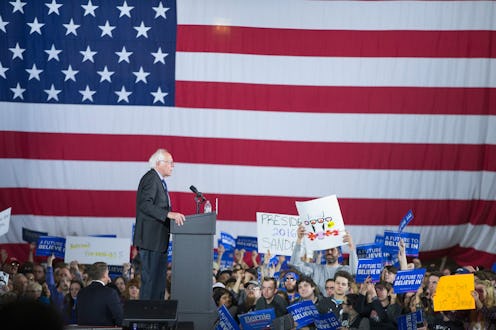News
Why Bernie Sanders Still Faces Long Odds
Bernie Sanders’ supporters had a slew of great news on Saturday night, as the Vermont senator won primary contests in Hawaii, Washington, and Alaska. There's a lot of optimism that he may be able to cut into Hillary Clinton’s lead and win the Democratic presidential nomination. And yet despite the votes on Saturday, Bernie Sanders still has a steep uphill climb to the nomination. And no, it’s not because of superdelegates.
First, let’s look at where the race stands. After Saturday’s primaries, Sanders trailed Hillary Clinton by 268 pledged delegates. There are about 2,073 delegates remaining, and in order to close get the nomination, Sanders will need to win around 57 percent of them. In the contests that have taken place so far, he’s won about 43 percent of the delegates at stake. This means that to get the nomination, Sanders will need to do better relative to Clinton than he has in the past.
The “relative to Clinton” part is very important. Sanders doesn’t just need to win more than he has before; he needs to win states by bigger margins than he has before, because Democratic delegates are allocated proportionally based on each candidates’ share of the vote in each state. If Sanders wins a bunch of states by very slim margins (as he surprisingly did in Michigan, for example), then he and Clinton will get roughly the same number of delegates from each state, and that does nothing to close the gap.
Sanders, then, needs big victories, not small ones. But unfortunately for him, the remaining states are likely to be more difficult for him to win than the ones that have already voted. This may sound counterintuitive. There are a lot of generally progressive states that have yet to vote, and a few of them — California and New York, namely — are worth a truckload of delegates. Shouldn’t this be encouraging to Sanders supporters?
Well, it’s not that simple. For one, Sanders hasn’t actually performed better in blue states than in purple or red ones so far. Sure, he won in a few more liberal places, like Washington, Maine, and Hawaii. But he also lost one of the biggest blue states in the country, Massachusetts. More importantly, he has won a number of victories in very conservative states, like Oklahoma, Kansas, and Nebraska.
The much better predictor of Sanders’ success isn’t whether states are progressive or conservative. It’s whether they hold caucuses or primaries. So far, Sanders has won 10 out of 13 caucuses, but only four out of 21 primaries. While nobody can say for certain why this is, it’s been suggested that Sanders triumphs in caucuses because the format rewards candidates with deeply loyal and committed supporters, since voters must remain onsite for an hour or more in order to participate.
This is a big part of why Sanders has an uphill climb. There are only four caucuses left in the Democratic primary. What’s more, none of them — North Dakota, Wyoming, Guam, or the U.S. Virgin Islands — are worth a whole lot of delegates. By contrast, there are still 17 primaries left, and they amount to some of the biggest races in the election.
Even beyond the voting format, there are other reasons to be skeptical of Sanders’ chances in the blue states that remain. California is a great example of this. With 564 delegates, it's worth more to the Democrats than any other state, and its reputation as a leftist hippie haven has buoyed the hopes of Sanders supporters that he’ll score a runaway victory there and close the gap between himself and Clinton.
But a blue state is different from a progressive state, and despite being blue, California isn’t nearly as progressive as its reputation would suggest. In 2008, when America elected its first black president, California voted to ban gay marriage, and it took the courts to shoot it down. Four years later, California voters rejected two very progressive ballot propositions. One would have ended the death penalty, while the other would have raised taxes to pay for public schools. That second one should be particularly worrisome for Bernie supporters, as it’s literally one of his flagship policies.
There are other factors working against Sanders in the remaining states. So far, he’s done much better in heavily white states than in more diverse ones, and California and New York are very diverse states. There’s also the fact that Sanders trails Clinton in the polls of the biggest remaining states. It would not be impossible for Sanders to buck all expectations and pull off an upset. But don’t let his recent victories fool you; Hillary Clinton is still the heavy favorite to win the Democratic presidential nomination.
